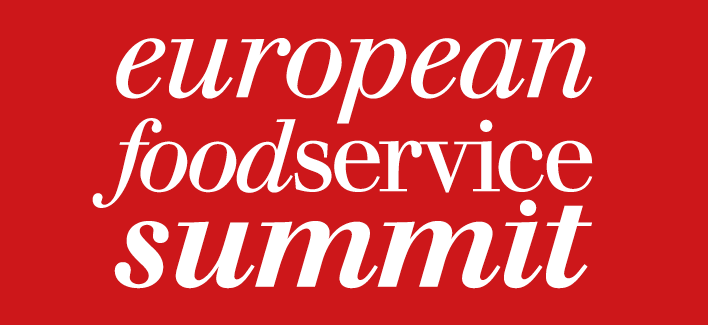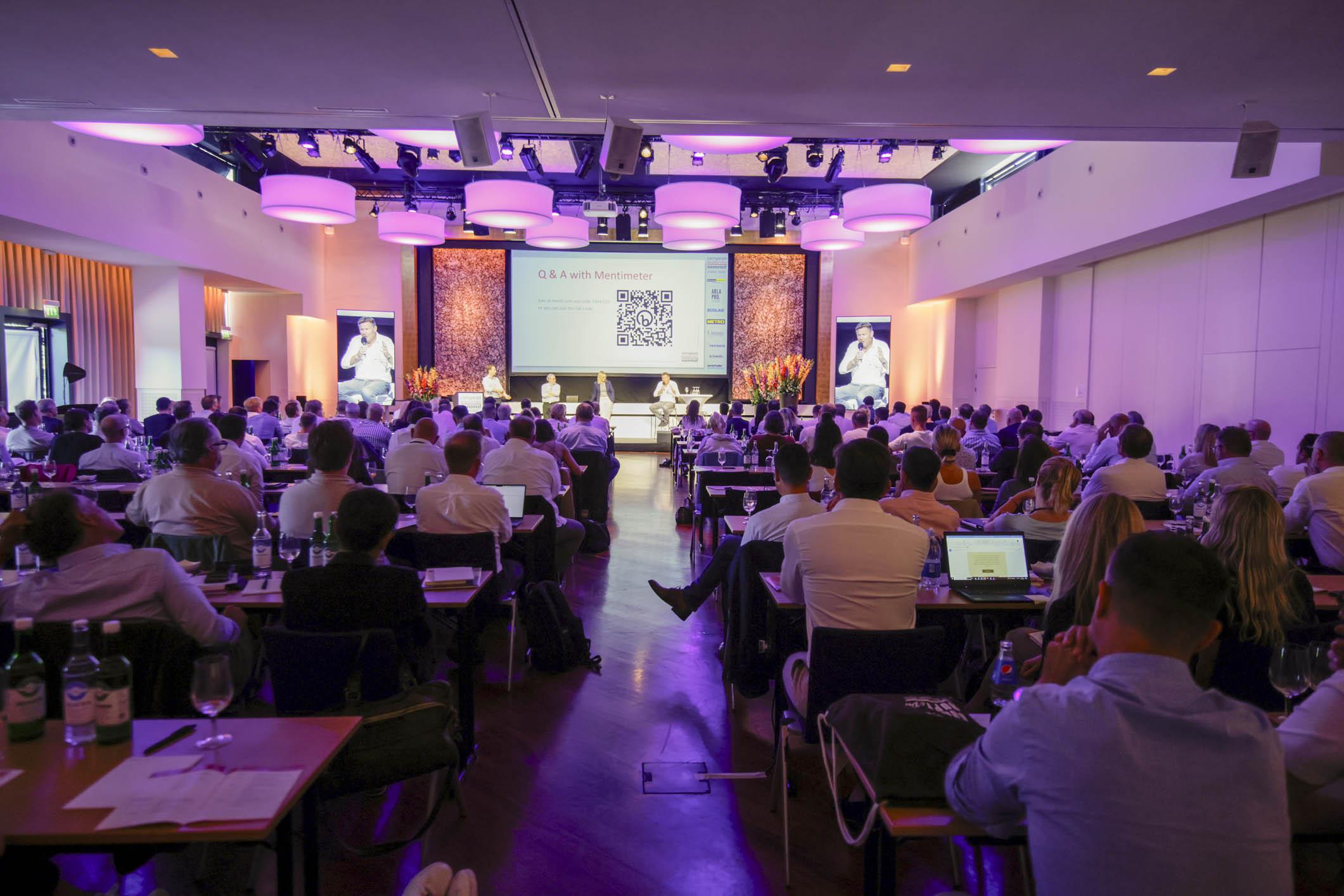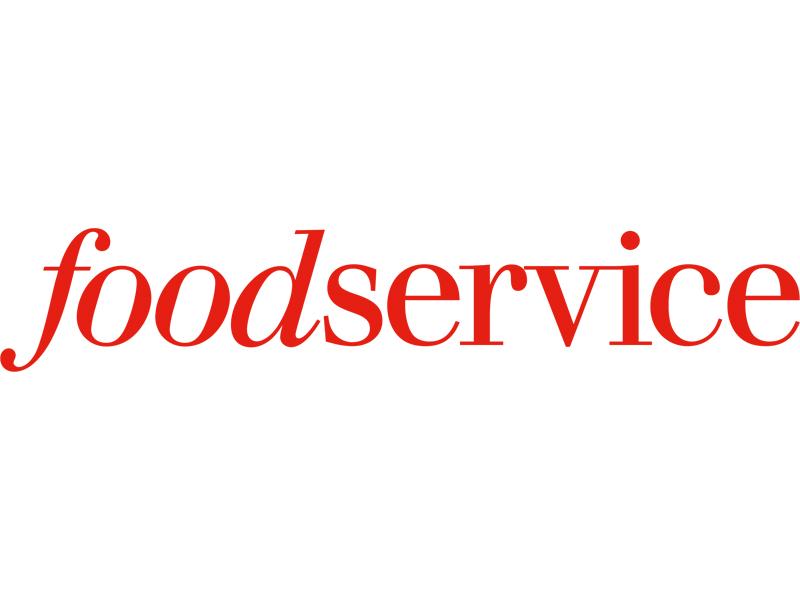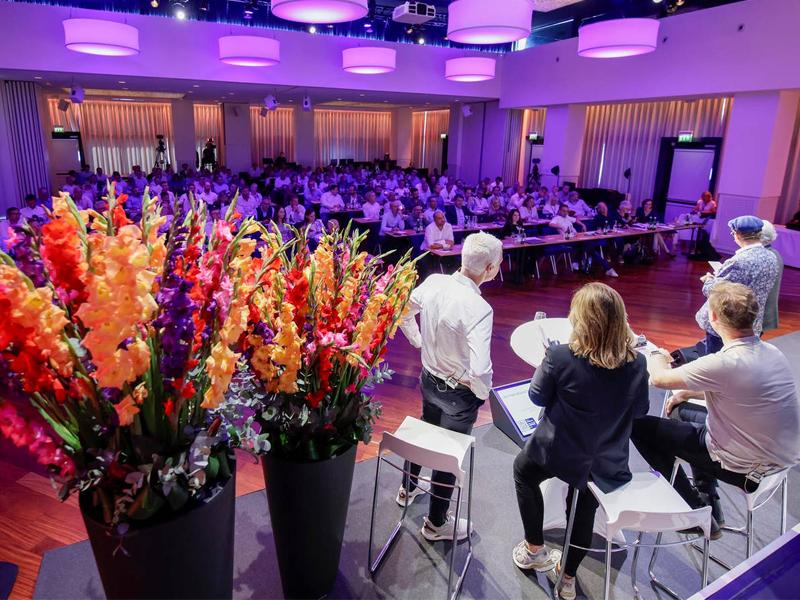Topics of today and the future
On the second day of the European Foodservice Summit, the topics of sustainability and digital innovation were two focal points.
Market researcher Jochen Pinsker, Industry Advisor Foodservice Europe at Circana (formerly npdgroup), opened the second day of the congress with facts and figures: With spending of 313 billion euros, the out-of-home market in the five major European markets will be back to pre-Corona levels by the end of 2023. Figures in the UK, Germany, France, Italy and Spain on a monthly basis show the recovery in the sector even more clearly, with values higher than in 2019 since February.
“The rollercoaster ride is over,” explains Pinsker, emphasising, “This development is entirely driven by higher average spend, minus 10 per cent visits.” The biggest influence on this is the now strongly increased home office share. However, there are clear differences between the countries. In the UK, the home office share is 51 per cent, in Italy only 39 per cent. “Working at home also means eating at home. The biggest competitor of the restaurant trade is therefore the fridge at home,” Pinsker summarises.
Although diners said in a survey that they pay attention to prices, this would not be reflected in behaviour. The out-of-home market has arrived in the new reality and is more oriented towards business off-premise. This has a positive effect on the quick service industry. It is also important that guests love to order digitally, he said. Inclusion and sustainability are important issues, but in the end it is still about taste, atmosphere and price when choosing a restaurant.
According to Pinsker, the industry is considered quite innovative and people are willing to pay for it. They want innovations in taste and ingredients, but of course also in sustainability.
Put people first!
“Who here in the audience is struggling with staff shortages?” With this question, Dutch gastro-entrepreneur Sven Sallaerts (Younique Concepts) entered the next red-hot topic. Confirmed of the explosive nature of the problem by the number of hands raised, Sallaerts let it be known about his own company: “We don’t have staffing problems.” Seven years after starting with Pesca in Amsterdam, his company counts ten concepts, with three more in the pipeline. The fish & seafood concept Pesca is on the move abroad, with first openings planned in Hamburg and Nice.
Sallaert’s answer to the changing labour market is clear: “Adapt or die!” The Dutch hospitality entrepreneur is convinced that if a hospitality company wants to attract and retain Gen Z employees, it must adapt to new expectations. Meaning, participation, identity and transparency are the keywords that define Younique’s adapted corporate culture. In concrete implementation, Sallaerts reports, the 3.5/4-day week, a non-fixed number of holidays, team surprises (such as a team tour to Paris) or unlimited after-work drinks count for example. The reward? Employees who identify with the company, stay – and if they move on, still remain brand ambassadors for life.
European Green Deal as a challenge
Professor Arnaud Dufour, a renowned scientist and absolute expert on environmental issues, gave an overview of the impact of the European Green Deal in the late morning.
Clear statement: As an operator, start implementing sustainability in your company now – you will not get around it anyway. All this against the background that Europe is to be CO2-neutral in 2050. The ambitious interim goal is to reduce greenhouse gas emissions by at least 55 percent by 2030.
The clusters that affect hosts primarily revolve around packaging, food waste, recycling, animal welfare and the labelling of ingredients up to the supply chain. “Basically, the specifications from Brussels affect the entire restaurant process,” says Dufour. As chairman of the Research Institute for Sustainability and Energy Policy, he has conducted extensive studies and analyses on behalf of the European Union on the impact of the European Green Deal on the economy and society. His summary in short: Europe’s restaurants should become greener, healthier and more sustainable.
Sustainability as a must-have
“We are not a sustainable company, we are as sustainable as possible,” Jordi Pascual, Co-Founder and Managing Director, of the restaurant brand Udon, made clear right at the beginning of his presentation. The Asian noodle concept based in Barcelona currently has 72 restaurants in five countries and has set itself the goal of generating a turnover of +65 million euros with 100 units in 2024. D Jordi described the planned expansion as just one of many challenges that have a negative impact on the company’s sustainability. Also, many ingredients come from Japan and the share of delivery and take-away is increasing. The Action Plan 2023-2025 now aims to make the Udon brand more sustainable. Jordi gave insight into the four main projects:
- People First: We work to make our teams happy. This includes sustainability audits and awards, Udon University and a Happiness Index.
- Product Matters: good for people and good for the environment. For example, Udon has reduced salt and sugar content, is plant-based and uses 100 per cent organic salmon.
- Planet Lovers: we are aware that our actions have an impact and we want it to be positive. The carbon footprint is reduced and offset, and the delivery business is 100 per cent plastic-free.
- Passion Driven: We are passionate about what we do.
According to Pascual, one of the lessons learned so far is that sustainability measures are also quite profitable. Switching to local suppliers, for example, has already reduced both costs and carbon footprint. “We want to be a company that society wants to exist.”
Italo-food brand Big Mamma has chosen a different path, and this too is having a positive impact on the company’s bottom line. Co-Founder Victor Lugger showed why the effort of a B-Corp certification is worth it. Such a company wants to combine private economic benefit with the common good: In addition to profit, a positive impact on society, employees, the general public and the environment are defined corporate goals. Simply put: ecologically and socially sustainable business. In 2018, Big Mamma was the first hospitality company to achieve B-Corp certification.
The restaurant brand, which currently has 23 locations in Europe, was able to increase its Ebitda margin by implementing the numerous measures. For example, the switch to a digital menu and digital payment resulted in less paper and a higher chair turnover. Food waste reduction also had a positive impact. Thanks to the certification, Big Mamma is a mission-driven company, and Lugger has since observed a 10 per cent reduction in staff turnover. This saves 360,000 euros annually.
The biggest challenge for Lugger in implementing the certification was: “It takes CEO time. But if you’re not personally involved yourself, it doesn’t work.” But he also lets it be known: “It is valuable CEO time. Our 2,400 employees know what they are doing as a B-Corp company. And they can be proud!” As a tip, he shares that many things can already be implemented in the business to become more sustainable before having to invest money. “There are numerous low-hanging fruits,” says Lugger.
Food tech: more efficiency for more human warmth
Julian Metcalfe, co-founder of Pret A Manger and now CEO of the quickserve Asia concept itsu, gave an entertaining talk on the innovation potential of his brand. Itsu recently opened its 100th unit, Metcalfe describes the company’s mission as follows: “We want to bring nutritious, affordable food to the people”. The retail price is 8 euros for a meal, which, according to Metcalfe, requires maximum efficiency.
This cannot be done without technology, Metcalfe said, although he made no secret of the fact that tech is not his favourite subject. “The more tech you pack into a company, the more you have to wrap it in warmth and humanity, I once said to one of our tech executives. He was not enthusiastic,” Metcalfe said.
Nevertheless, itsu benefits from a very high degree of digitalisation. As an example, he cites a nigiri robot that rolls 10,000 rice balls a day in each unit. “It’s about getting rid of such boring tasks,” says Metcalfe. Not only for more efficiency, but also for more employee satisfaction. Because Metcalfe is convinced: “The essence of a brand lies in the people”. However, he appealed to the participants of the event that one has to stand up to one’s own shareholders from time to time in order to push through human decisions.
Following Metcalfe’s entertaining presentation, five innovative foodtech companies were introduced in short videos:
Kitopi: A Dubai-based dark kitchen concept with now more than 100 brands and operations trimmed for maximum efficiency. The company has invested more than 50 million dollars in its own technical infrastructure.
Goodbytz: The German start-up for fully automated robotic kitchens is now used by large community caterers, among others. Before that, however, the concept had already been tested “under the radar”, for example as a product site in delivery-only concepts”.
Ingka Group: The Ikea parent company uses the innovative, AI-based visual recognition system Winnow Vision to reduce food waste. In 2022, the company has reduced its own food waste by 54 per cent.
Nala Robotics: The company currently offers five commercially available types of cooking robots, including those that specialise in frying or baking dough.
China as an innovation driver
Frank Sieren, China expert, TV journalist and author, spoke about China’s new role in the global economy. “For decades, a minority of the world has set the rules for the majority of the world. That will now change,” Sieren announced. The BRICS countries (Brazil, Russia, India, China and South Africa) have the economic power because, Sieren said, in one to two years their share of the world economy will be larger than that of the old world powers.
China’s power, however, has long since been demonstrated not only in volume, observes Sieren. No, China is already taking on the role of trend-setter and driver in numerous industries – including the food service industry. Sieren named three sectors that will attract global attention to the Chinese food industry in the near future. “One is robotics,” Sieren said. People are queuing outside China’s first unmanned robot restaurant, he said – “not because the robots are a children’s attraction, but because the food is seen as high quality.”
The second example: food delivery. Regular ordering has long been part of everyday Chinese life, as has delivery by e-scooter. “But since even the e-scooter can’t avoid the daily traffic jams, China’s food suppliers are switching to drone delivery. Deliveries are made to distribution points, and customers take out their food by code.” And perhaps the third most impactful example, “China will lead the meat substitute segment – and it will do so because the government wants and encourages it,” Sieren is convinced. “We are now in the position that WE have to adapt,” is Sieren’s insight.
The day ended with conclusions and a farewell lunch together.





